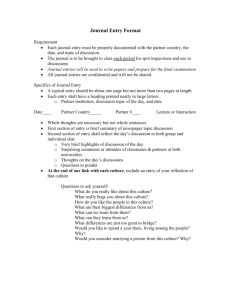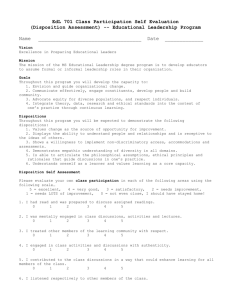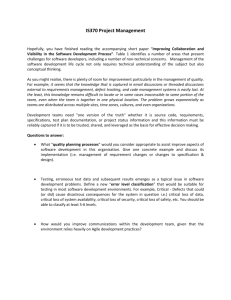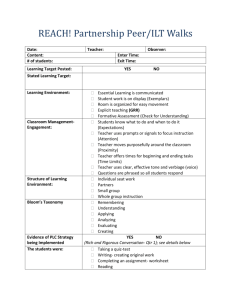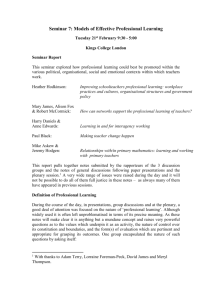European Central Banking
advertisement
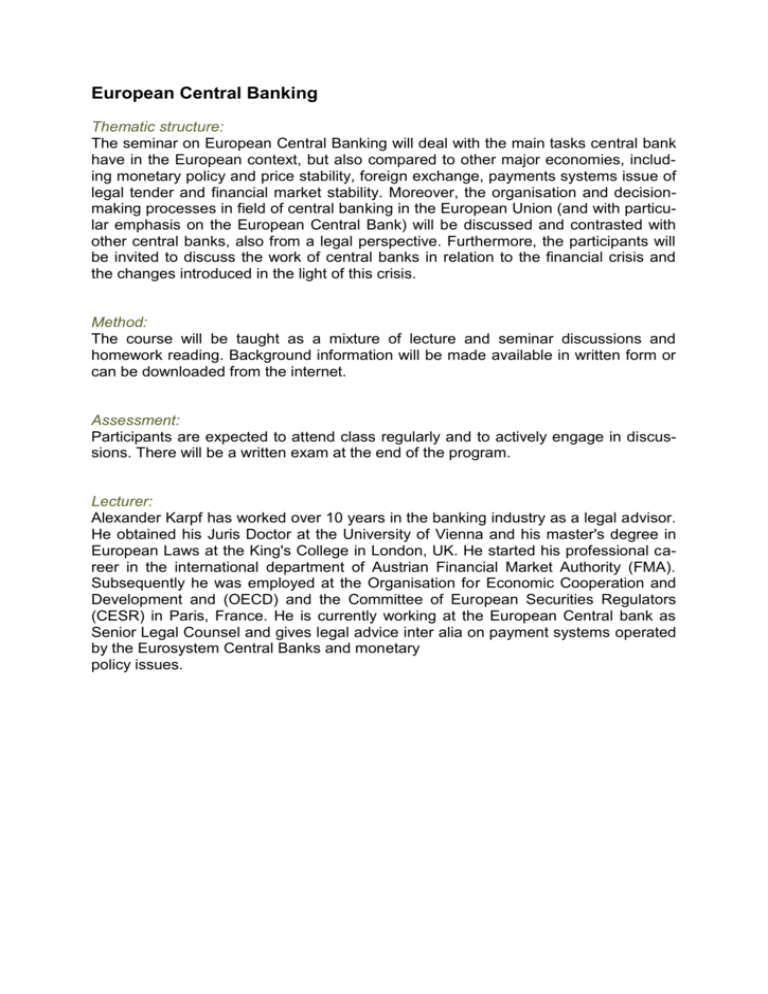
European Central Banking Thematic structure: The seminar on European Central Banking will deal with the main tasks central bank have in the European context, but also compared to other major economies, including monetary policy and price stability, foreign exchange, payments systems issue of legal tender and financial market stability. Moreover, the organisation and decisionmaking processes in field of central banking in the European Union (and with particular emphasis on the European Central Bank) will be discussed and contrasted with other central banks, also from a legal perspective. Furthermore, the participants will be invited to discuss the work of central banks in relation to the financial crisis and the changes introduced in the light of this crisis. Method: The course will be taught as a mixture of lecture and seminar discussions and homework reading. Background information will be made available in written form or can be downloaded from the internet. Assessment: Participants are expected to attend class regularly and to actively engage in discussions. There will be a written exam at the end of the program. Lecturer: Alexander Karpf has worked over 10 years in the banking industry as a legal advisor. He obtained his Juris Doctor at the University of Vienna and his master's degree in European Laws at the King's College in London, UK. He started his professional career in the international department of Austrian Financial Market Authority (FMA). Subsequently he was employed at the Organisation for Economic Cooperation and Development and (OECD) and the Committee of European Securities Regulators (CESR) in Paris, France. He is currently working at the European Central bank as Senior Legal Counsel and gives legal advice inter alia on payment systems operated by the Eurosystem Central Banks and monetary policy issues. European Economic and Soical Policy Thematik structure: This seminar aims at analysing modalities, impacts and expectations of market globalization within a European perspective. On the one hand, it will familiarize students with international economic theory and European political economy. On the other hand, it will develop students' skills in understanding current issues related to European, regional and multilateral integration - i.e. non-agricultural market access (NAMA), agriculture, services, intellectual property rights, environmental and social norms, food security, pro-growth and development agenda, etc. The first session will provide to students a theoretical background in European market integration -gains from trade in goods and services, welfare outcomes induce by protectionist instruments, benefits from multilateral and regional agreements. The second session will analyze the European trade policy -current European protectionism political economy and impact assessment, European bilateral and multilateral agreements, relations with developing countries. The third session will focus on the agricultural liberalization process, a sensitive issue among European member States, a major knock with trade partners - distortions induced by farm support, rural development, environmental policy, food security, European budget review. The last session will consider the multilateral trading system and the European stances within the current round of negotiations -World Trade Organization structure and regulation, Doha Round agenda, actors and outcome simulations. Method: The course will be taught as a mixture of lecture and seminar discussions and homework reading. Background information will be made available in written form or can be downloaded from the internet. Assessment: Participants are expected to attend class regularly and to actively engage in discussions. There will be a written exam at the end of the program. Lecturer: Dr. Pierre Boulanger is presently research fellow at Goethe Universität, Frankfurt, and Groupe d'Economie Mondiale (GEM Sciences Po), Paris. In 2010, he completed its Ph.D dissertation in economics at Sciences Po under the supervision of Prof. Patrick A. Messerlin. He also holds a master's degree in international economic relations from Sciences Po and post-degrees in economics from Paris Dauphine University, Autonomous University of Madrid and University of Poitiers. His research areas are agricultural, food and rural development policies, international trade and development economics. History of European Integration Thematik structure: The course aims at analysing the history of European Integration as one major example of regional integration. It will familiarize students with the key concepts of politico-economic integration in general and the milestones of the development of the European Union in particular. In addition, it will develop students' skills in understanding current topics related to European integration - i.e. the Lisbon Treaty, the European Monetary Union and the European debt crisis (Euro-crisis). The first part will provide students with an historical overview of the evolution of the European Union starting at the early post-war period and lasting until the signing of the Lisbon Treaty at the end of 2009. The following intergovernmental assignments will be analysed at great length: the Treaty of Rome, the Single European Act, the Maastricht Treaty and the Lisbon treaty. The second part will analyze the 'Big Five' European institutions primarily focusing on the structure, legislation and decisionmaking process of the European Union. The last part will focus on current topics related to European integration - e.g. EU enlargement, the financial market and the European debt crisis. Moreover, this session will elaborate the question whether the European Union can be regarded as a role-model compared to the USA andChina? Method: The course will be taught as a mixture of lecture and seminar discussions and homework reading. Background information will be made available in written form or can be downloaded from the internet. Assessment: Participants are expected to attend class regularly and to actively engage in discussions. There is a presentation to be held at the end of the course. Lecturer: Manuel Wörsdörfer is a graduate from Bayreuth University. He received his Bachelorand Master-degree in Philosophy and Economics with particular emphasis on European Integration and International Economics. Since then he has worked as a Research Fellow of the Cluster of Excellence 'The Formation of Normative Orders', Goethe-University/Frankfurt (Research Project: Genesis of Economic Norms). His current research interests are Economic and Business Ethics, the History of Economic Thought, and European Integration. He has held lectures in Economic Ethics. European Law Thematik structure: The course will give a brief overview regarding the legal foundations, fundamental structural elements and pivotal substantive rights of European Union law. The first two units (Monday and Tuesday) will be devoted to explaining the legal construction of the Union, the main features of its most important institutions and the law-making instruments employed by them. In the second part (Thursday and Friday) the course will focus on the fundamental rights and freedoms of the Union's legal order, in particular the freedoms that serve as cornerstones of the Common or Internal Market. A case study at the end will demonstrate how they work in practice. Method: The course will be taught as a mixture of lecture and seminar discussions and homework reading. Background information will be made available in written form or can be downloaded from the internet. Assessment: Participants are expected to attend class regularly and to actively engage in discussions. There will be a written exam at the end of the program. Lecturer: Prof. Dr. Alexander Lorz is Professor at the Heinrich Heine University, Düsseldorf where he holds the chair of European Law and Public International Law. He earned his Master of Laws (LL.M.) from Harvard Law School and his PhD (Dr. jur.) from the University of Marburg. From 2007 to 2009 he was Vice Minister (Deputy Secretary) for Higher Education, Research and the Arts (State of Hessen, Germany). Alexander Lorz is member of the Board of the German-American Lawyers' Association and Regional Director in Düsseldorf. Also, he is member of the Board of the Düsseldorf Institute for Foreign and Security Policy Financial Markets Thematik structure: The course will include recent European developments such as the Financial Services Action Plan (integrated financial markets in Europe). The European Directive on Insider Dealing and Market Manipulation (Market Abuse) increased standards for market integrity in the securities field. This contributes to the harmonization of the rules for market abuse throughout Europe. The European Directive on Prospectuses (A European Passport for Issuers) simplified capital raising procedures across Europe. Furthermore, the Markets in Financial Instruments Directive (MiFID) will be covered. The European Commissions recently published legislative proposals to transform the European Committees of supervisors into supervisory authorities with real teeth will be discussed. The second part of the course will reflect national developments in Germany in the light of the financial crisis. Method: The course will be taught as a mixture of lecture and seminar discussions and homework reading. Background information will be made available in written form or can be downloaded from the internet. Assessment: Participants are expected to attend class regularly and to actively engage in discussions. There will be a written exam at the end of the program. Lecturer: Dr. Jens Fürhoff, lawyer, is Senior Director and head of the Anti- Money-Laundering Group of the German Federal Financial Supervisory Authority (Bundesanstalt für Finanzdienstleistungsaufsicht). He has fifteen Years of working experience in the German Financial Markets Regulator with former responsibilities for monitoring ad hoc disclosure obligations of listed companies, insider dealing investigations, trade monitoring and responsibilities for legal and legislative issues on national and European level. He was more than five years the German contact person in the Committee of European Securities Regulators (CESR) and member of several CESR Working Groups. He is author of several publications on legal aspects of the capital market regulation and furthermore, Speaker on several Seminars. Financing an Entity: From term sheet to documentation Thematik structure: For most entities it is essential to be provided with debt financing. However, it is sometimes a long way from first discussions with the bank about financing needed to the final set of documentation. In this course you will learn the essentials of a termsheet and how its terms will be integrated into the respective documentation. Jörg Kupjetz will show you both the entity's and the bank's perpective in this process. Method: The course will be taught as a mixture of lecture and seminar discussions and homework reading. Background information will be made available in written form or can be downloaded from the internet. Assessement: Participants are expected to attend class regularly and to actively engage in discussions. There will be a written exam at the end of the program. Lecturer: Prof. Dr. Jörg Kupjetz is a professor of the Fachhochschule Frankfurt am Main with specialisation in civil law, company law and finance law. He also runs the LLMprogramme "Negotiating and Designing Contracts". In additiona, he is a partner of the international law form Taylor Wessing in Frankfurt. There his clients are German and foreign banks, financial institutions and investors. He advises on a broad range of financing transactions, especially relating to acquisition finance, project finance, property finance and structured finance. Jörg Kupjetz studied law at the universities of Osnabrück, Heidelberg and Los Angeles and has been promoted to Dr. jur. at the university of Heidelberg. After his Second Legal State Exam he worked as a lawyer in the Frankfurt office of two leading international law firms, Jörg Kupjetz has also been seconded to an international investment bank in London. He has received a diploma in bank business administration and has been qualified as a solicitor in England and Wales. INTERCULTURAL COMMUNICATION Thematik structure: The aim of the course Intercultural Communication is to provide students with an overview of the most important themes of Intercultural communication. These include: cultural awareness; cultural clashes and culture shock; integration; verbal and non-verbal communication styles; attitudes to time; different value systems in interpersonal relationships. We profile selected national cultures and study different management styles. We deal with numerous case studies in order to understand how intercultural communication works in practice. A range of media and types of exercises are employed to give students a varied and interesting introduction to the subject. By the end of the course, students will have substantially increased their cultural awareness and intercultural competence. Method: The course will be taught as a mixture of lecture and seminar discussions. Background information will be made available in written form or can be downloaded from the internet. Assessment: Participants are expected to attend class regularly, and to actively engage in discussions. There is a presentation to be held at the end of the course. Lecturer: Dr. Jens Fürhoff, lawyer, is Senior Director and head of the Anti-Money-Laundering Group of the German Federal Financial Supervisory Authority (Bundesanstalt für Finanzdienstleistungsaufsicht). He has fifteen Years of working experience in the German Financial Markets Regulator with former responsibilities for monitoring ad hoc disclosure obligations of listed companies, insider dealing investigations, trade monitoring and responsibilities for legal and legislative issues on national and European level. He was more than five years the German contact person in the Committee of European Securities Regulators (CESR) and member of several CESR Working Groups. He is author of several publications on legal aspects of the capital market regulation and furthermore, Speaker on several Seminars. - Money and Macroeconomics Thematik structure: The first part of the seminar deals with the macroeconomics of the open economy. Keywords are balance of payments, capital mobility and exchange rates. The Mundell-Fleming model with fixed and flexible exchange rate regimes will be investigated in detail in order to analyze the effects of fiscal and monetary policy. The second part of the seminar applies the theory to reality: The course examines the European Monetary Union as a potential example for an optimal currency area, provides an overview of the road to a single currency in Europe and assesses the challenges for the future stability of the Euro in view of the Greek debt crisis. The course then concludes by discussing the macroeconomic causes and consequences of the financial crisis of 2008. Method: The course will be taught as a mixture of lecture and seminar discussions and homework reading. Background information will be made available in written form or can be downloaded from the internet. Assessment: Participants are expected to attend class regularly and to actively engage in discussions. There is a presentation to be held at the end of the course. Lecturer: Anne Jurkat has studied economics at Goethe University, Frankfurt, where she received her degree in 2004. Since then she has worked as a research assistant at the chair of Economic Development and Integration, Goethe University, Frankfurt and pursued her doctoral studies. Her research interests are growth theory with particular emphasis on CES production functions and monetary growth theory. She has held lectures in growth theory at the Master level and taught a class on European Monetary Integration at the International Summer University in Shanghai in 2009.

